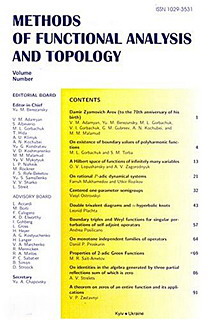Vol. 19 (2013), no. 2
The inner structure of the Jacobi-Laurent matrix related to the strong Hamburger moment problem
MFAT 19 (2013), no. 2, 97-107
97-107
The form of the Jacobi type matrix related to the strong Hamburger moment problem is known \cite{N5,BD}, i.e., there are known the zero elements of corresponding matrix. We describe the relations between of non-zero elements of such matrices, i.e., we describe ''the inner structure'' of the Jacobi-Laurent matrices related to the strong Hamburger moment problem.
An operator approach to Vlasov scaling for some models of spatial ecology
D. Finkelshtein, Yu. Kondratiev, O. Kutoviy
MFAT 19 (2013), no. 2, 108-126
108-126
We consider Vlasov-type scaling for Markov evolution of birth-and-death type in continuum, which is based on a proper scaling of corresponding Markov generators and has an algorithmic realization in terms of related hierarchical chains of correlation functions equations. The existence of rescaled and limiting evolutions of correlation functions and convergence to the limiting evolution are shown. The obtained results enable us to derive a non-linear Vlasov-type equation for the density of the limiting system.
Tachyon generalization for Lorentz transforms
MFAT 19 (2013), no. 2, 127-145
127-145
In the present paper we construct an expansion of the set of Lorentz transforms, which allows for the velocity of the reference frame to be greater than the speed of light. For maximum generality we investigate this tachyon expansion in the case of Minkowski space time over any real Hilbert space.
Parabolic problems and interpolation with a function parameter
Valerii Los, Aleksandr A. Murach
MFAT 19 (2013), no. 2, 146-160
146-160
We give an application of interpolation with a function parameter to parabolic differential operators. We introduce a refined anisotropic Sobolev scale that consists of some Hilbert function spaces of generalized smoothness. The latter is characterized by a real number and a function varying slowly at infinity in Karamata's sense. This scale is connected with anisotropic Sobolev spaces by means of interpolation with a function parameter. We investigate a general initial--boundary value parabolic problem in the refined Sobolev scale. We prove that the operator corresponding to this problem sets isomorphisms between appropriate spaces pertaining to this scale.
Remarks on Schrödinger operators with singular matrix potentials
Vladimir Mikhailets, Volodymyr Molyboga
MFAT 19 (2013), no. 2, 161-167
161-167
In this paper, an asymmetric generalization of the Glazman-Povzner-Wienholtz theorem is proved for one-dimensional Schrödinger operators with strongly singular matrix potentials from the space $H_{loc}^{-1}(\mathbb{R}, \mathbb{C}^{m\times m})$. This result is new in the scalar case as well.
Indefinite moment problem as an abstract interpolation problem
MFAT 19 (2013), no. 2, 168-186
168-186
Indefinite moment problem was considered by M. G. Krein and H. Langer in 1979. In the present paper the general indefinite moment problem is associated with an abstract interpolation problem in generalized Nevanlinna classes. To prove the equivalence of these two problems we investigate the structure of de Branges space $H(m)$ associated with a generalized Nevanlinna function $m$. A general formula for description of the set of solutions of indefinite moment problem is found. It is shown that the Kein-Langer description can be derived from this formula by a special choice of biorthogonal system of polynomials.
$\ell^{1}$-Munn ideal amenability of certain semigroup algebras
MFAT 19 (2013), no. 2, 187-190
187-190
In this paper we investigate ideal amenability of $\ell^{1}(G_{p})$, where $G_{p}$ is a maximal subgroup of inverse semigroup $S$ with uniformly locally finite idempotent. Also we find some conditions for ideal amenability of Rees matrix semigroup.
Decomposition of a unitary scalar operator into a product of roots of the identity
MFAT 19 (2013), no. 2, 191-196
191-196
We prove that for all $m_1,m_2,m_3 \in \mathbb{N},~ \frac{1}{m_1}+\frac{1}{m_2}+\frac{1}{m_3} \leq 1$, every unitary scalar operator $\gamma I$ on a complex infinite-dimensional Hilbert space is a product $\gamma I = U_1 U_2 U_3$ where $U_i$ is a unitary operator such that $U_i^{m_i} = I$.


